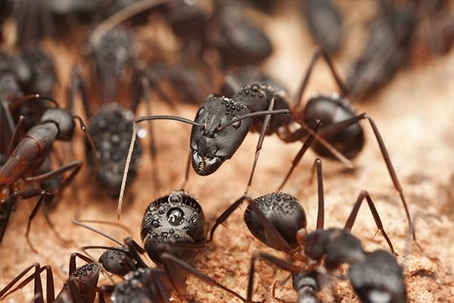Ants in the house are no fun. They make dirty trails on the kitchen floor and invade cereal boxes. Some species of ants even destroy wood or inflict painful bites. If you have ants in your South Carolina home, a pest control company can identify the problem and treat your home to rid your space of ant pests. The following four ants are the most common ant types found in South Carolina households that you should be aware of.
Odorous House Ant
Odorous house ants smell like rotting coconut when they're crushed, which is where the ants get their name. Odorous house ants are tiny and may be either black or brown. Worker ants measure around 1/8 inch in length. Odorous house ants live in colonies of varying sizes. Some indoor and outdoor colonies may consist of a few hundred members, while other colonies may have up to a hundred thousand individuals.
Odorous house ants can commonly be found nesting in or under the following:
- Wood piles
- Debris
- Stones
- Logs
- Insulation
- Wall voids
- Flooring materials
Odorous house ants adore sweets, so you'll often find them invading your cabinets and counters looking for sugar and crumbs.
Pavement Ant
Pavement ants are another diminutive species of ant. The pavement ant is believed to have sailed with 18th and 19th-century merchant vessels to the United States, so this species has been vexing people along the Atlantic coast for centuries.
Pavement ants measure between 1/10 and 1/8 inch long. Like odorous house ants, the pavement ants are dark brown to black. Pavement ants also have parallel lines on their heads and thoraxes. Pavement ants move more slowly than most ants, and they feed indoors and outdoors on dead insects, sweets, and greasy foods.
Pavement ants prefer to nest in soil under sidewalks and building slabs or stones and pavers. However, they will also nest inside cracks in concrete block walls and foundations.
Carpenter Ant
Unlike termites, carpenter ants don't eat wood. Instead, carpenter ants chew tunnels in wood to create nesting sites, which can lead to extensive damages over time as well as costly repairs. To avoid this, these ants should be identified and eliminated before they have the chance to damage your home.
Two common species of carpenter ants invade homes in the Southeast. The black carpenter ant is black and has yellow hairs on its abdomen, while the Florida carpenter ant has a reddish head and thorax with a black abdomen. Both species of carpenter ants measure between 3/8-inch and 5/8-inch long.
Carpenter ants will colonize the yard or the home, but they prefer sites near water and moist wood. Areas where carpenter ants nest include rotting and damp wood near:
- Chimneys
- Skylights
- Bathtubs and showers
- Dishwashers
- Porch supports
- Eaves
Outdoor-foraging carpenter ants, like many ant species, feed mostly on honeydew secreted by aphids and other insects. You may notice carpenter ants looking for fresh honeydew on trees and plants. Inside homes, carpenter ants feed on the same greasy, sweet foods that other ants enjoy.
Fire Ant
The red imported fire ant is an aggressive, biting ant that's present in 74 of South Carolina's counties. Fire ant stings become small blisters that are painful and itchy. Some people are highly allergic to imported red fire ant stings. Fire ants can range from 1/8 to 1/4 inch long depending on the form of the individual ant. Minor workers are smaller than major workers, and all forms are reddish or dark brown.
Fire ants build mounds outdoors in clay and sandy soils. Mounds may contain thousands of workers. Fire ants, including red imported fire ants, can enter homes and sting the occupants. Fire ants come inside homes when they forage for food and nesting materials.
If any species of ants are invading your home, contact The Original Bugman Pest Elimination, Inc. to schedule an inspection and comprehensive ant treatment. We use baits and safe chemical methods to combat ant problems for homeowners throughout the regions of Lexington, Columbia, and Chapin, South Carolina.
To eliminate these ants, consider investing in a professional home pest control plan. To get started with our ant control services, reach out to us today!
Schedule Your Free Inspection
Complete the form below to schedule your no-obligation inspection.

